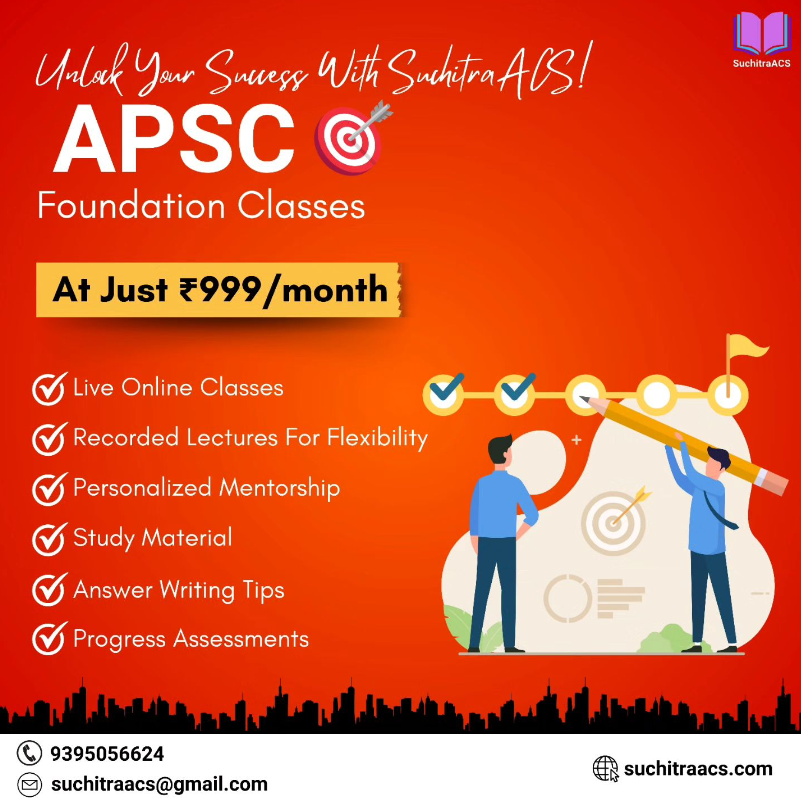APSC MCQs / APSC Prelims Practice Questions based on Assam Tribune (Daily) – 17/10/2024
For APSC CCE and other Assam Competitive examinations aspirants, practicing Daily MCQs is vital. This blog covers most important Prelims questions from the Assam Tribune today (17-10-2024). These issues are key for both APSC Prelims syllabus, offering insights into the important topics of current affairs.
APSC MCQs / APSC Prelims Practice Questions (Date: 17/10/2024)
1. With reference to India’s stance on China’s Belt and Road Initiative (BRI) as highlighted in the SCO conclave, consider the following statements:
- India has consistently opposed the BRI due to concerns over sovereignty related to the China-Pakistan Economic Corridor (CPEC).
- The Shanghai Cooperation Organization (SCO) includes countries like India, China, and Japan.
- India’s opposition to the BRI is primarily due to environmental concerns associated with the infrastructure projects.
Which of the above statements is/are correct?
(a) 1 only
(b) 1 and 3 only
(c) 2 and 3 only
(d) 1, 2, and 3
Answer: (a) 1 only
Explanation:
- Statement 1 is correct: India has consistently opposed China’s Belt and Road Initiative, particularly the China-Pakistan Economic Corridor (CPEC), as it passes through Pakistan-occupied Kashmir (PoK), which India claims as its own territory. This opposition is based on concerns of sovereignty and territorial integrity.
- Statement 2 is incorrect: The Shanghai Cooperation Organization (SCO) includes India, China, Russia, Pakistan, and Central Asian countries like Kazakhstan, Kyrgyzstan, Tajikistan, and Uzbekistan. Japan is not a member of the SCO.
- Statement 3 is incorrect: While India’s opposition includes concerns over the strategic implications of the BRI, the primary concern is related to sovereignty due to the route of CPEC. Environmental concerns have not been the major basis of India’s opposition.
2. Consider the following statements about the Shanghai Cooperation Organization (SCO):
- The SCO includes both Central Asian and South Asian countries as full members.
- India recently refused to endorse the ‘One Belt One Road’ initiative during the SCO’s Council of Heads of Government meeting.
- The SCO was originally formed to address issues related to counter-terrorism and trade facilitation.
Which of the above statements is/are correct?
(a) 1 and 2 only
(b) 1 and 3 only
(c) 2 and 3 only
(d) 1, 2, and 3
Answer: (d) 1, 2, and 3
Explanation:
- Statement 1 is correct: The SCO comprises countries from Central Asia (e.g., Kazakhstan, Kyrgyzstan, Tajikistan, and Uzbekistan) and South Asia (India and Pakistan). Iran and Belarus are also members, reflecting a diverse regional grouping.
- Statement 2 is correct: As reported, India has maintained its refusal to endorse the ‘One Belt One Road’ initiative during the SCO meeting, citing concerns over sovereignty, especially due to CPEC.
- Statement 3 is correct: The SCO was initially formed to address regional security issues, counter-terrorism, and promote trade and economic cooperation among its members, which remain its key objectives.
3. Which of the following correctly describes the role of the National Investigation Agency (NIA) in the context of security operations in Assam?
(a) The NIA is responsible for border surveillance along Assam’s borders with Bhutan and Bangladesh.
(b) The NIA investigates cases related to terrorism and anti-national activities, including the detection of Jaish-e-Mohammad (JeM) activities in Assam.
(c) The NIA oversees all counter-insurgency operations in Assam, working directly under the state government.
(d) The NIA is involved in the implementation of counter-radicalization programs in educational institutions in Assam.
Answer: (b) The NIA investigates cases related to terrorism and anti-national activities, including the detection of Jaish-e-Mohammad (JeM) activities in Assam.
Explanation:
- Option (b) is correct: The National Investigation Agency (NIA) is India’s primary agency for counter-terrorism. It investigates cases of terrorism and anti-national activities, including those related to organizations like Jaish-e-Mohammad (JeM). The detection of JeM’s activities in Assam falls under the NIA’s purview.
- Option (a) is incorrect: Border surveillance is primarily managed by the Border Security Force (BSF) in coordination with state police, not the NIA.
- Option (c) is incorrect: While the NIA can be involved in certain operations, it does not oversee all counter-insurgency operations, which are typically managed by the state government in coordination with central agencies like the Indian Army.
- Option (d) is incorrect: The NIA’s primary role is investigation rather than the implementation of counter-radicalization programs.
4. With reference to India’s participation in the updated Kunming-Montreal Global Biodiversity Framework (KM-GBF), consider the following statements:
- The framework aims to protect at least 30% of the world’s land and oceans by 2030.
- India’s updated National Biodiversity Strategy and Action Plan (NBSAP) aligns with the goals of the KM-GBF.
- The KM-GBF is a binding agreement that requires member countries to contribute a fixed percentage of their GDP to biodiversity conservation.
Which of the above statements is/are correct?
(a) 1 and 2 only
(b) 2 and 3 only
(c) 1 and 3 only
(d) 1, 2, and 3
Answer: (a) 1 and 2 only
Explanation:
- Statement 1 is correct: The Kunming-Montreal Global Biodiversity Framework (KM-GBF) sets a global target of protecting at least 30% of the world’s land and marine ecosystems by 2030 to halt and reverse biodiversity loss.
- Statement 2 is correct: India has updated its National Biodiversity Strategy and Action Plan (NBSAP) to align with the KM-GBF, focusing on ecosystem restoration, conservation, and sustainable use of biodiversity.
Statement 3 is incorrect: The KM-GBF is a non-binding framework, meaning countries are not required to allocate a fixed percentage of their GDP to biodiversity conservation. It is based on voluntary commitments and national priorities.
✨ Looking for top-quality APSC online coaching at an affordable price?

🔔 Join Our WhatsApp Study Group!
For exclusive access to premium quality content, including study materials, current affairs, MCQs, and model answers for APSC CCE and other Assam competitive exams.
Click here to join: SuchitraACS Study WhatsApp Group
📚 Want to know more about SuchitraACS’s most affordable courses?
Click here to know more: SuchitraACS Courses for APSC CCE and Assam Competitive Examinations




